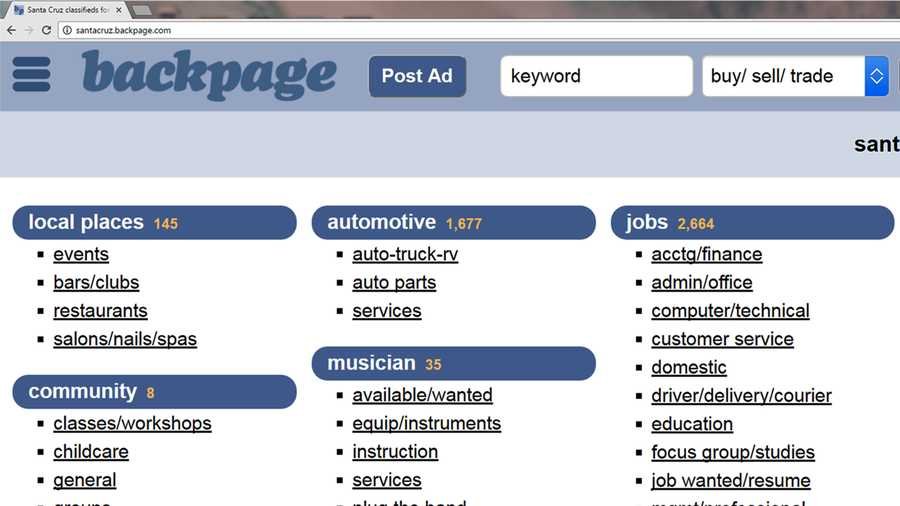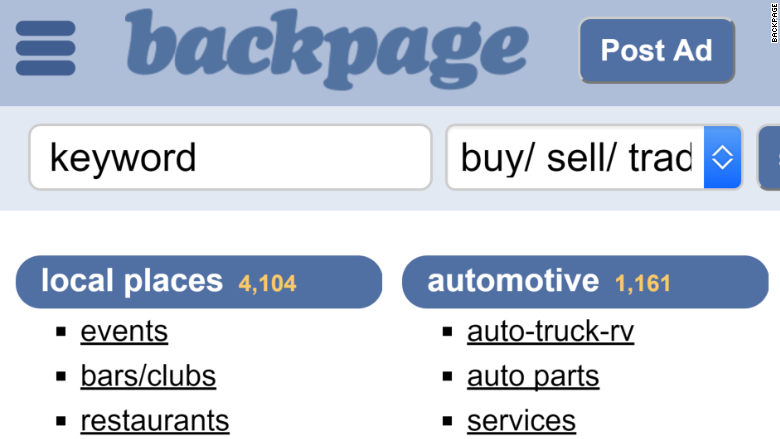Introduction
Backpage was a classified advertising website that gained notoriety for its controversial content and legal battles. Founded in 2004 by Michael Lacey and James Larkin, it was initially created as a competitor to Craigslist but soon became embroiled in controversies surrounding the facilitation of illegal activities, particularly sex trafficking. In this detailed article, we will examine the rise, controversies, and eventual downfall of Backpage, shedding light on the complex issues surrounding online classified advertising and its impact on society.
- The Rise of Backpage
Backpage started as a platform for classified advertisements, allowing users to post listings for a wide range of services and products, including job listings, real estate, and personal ads. It quickly gained popularity due to several factors:
- User-Friendly Interface: Backpage's interface was user-friendly and accessible, making it easy for both individuals and businesses to post ads.
- Wide Reach: The website's reach extended to numerous cities and countries, making it a go-to platform for local and international classifieds.
- Free Listings: Backpage initially offered free listings, which encouraged small businesses and individuals to use the platform for various purposes.
- Adult Section: While the site had various categories, its "Adult" section became particularly infamous. It allowed users to post explicit advertisements, which generated significant controversy and legal scrutiny.
Our Partners: TripTogether.com
Controversies Surrounding Backpage
Backpage's rapid growth and the proliferation of explicit content led to numerous controversies and legal challenges:
- Sex Trafficking Allegations: One of the most significant controversies was the allegation that Backpage facilitated sex trafficking through its adult section. Critics argued that the website enabled the exploitation of vulnerable individuals, including minors, by providing a platform for illegal sex trade.
- Legal Battles: Backpage faced a barrage of legal battles, including civil lawsuits and criminal charges. Authorities in various jurisdictions sought to hold the site's founders and operators accountable for facilitating illegal activities.
- Section 230 of the Communications Decency Act: Backpage often invoked Section 230 of the Communications Decency Act, a provision that shields online platforms from liability for user-generated content. This legal shield became a focal point in debates about online accountability and the responsibilities of online platforms.
- Congressional Investigations: Backpage's activities drew the attention of Congress, which conducted investigations into the website's operations. These investigations aimed to understand the extent of Backpage's involvement in sex trafficking and its potential impact on public safety.
Our Partners: Online Dating in 2021

The Downfall of Backpage
The controversies surrounding Backpage eventually led to its downfall:
- Seizure by U.S. Government: In April 2018, the United States Department of Justice seized com and its affiliated websites. The seizure was part of a broader effort to combat sex trafficking and hold those responsible accountable.
- Shutting Down the Adult Section: Prior to its seizure, Backpage voluntarily shut down its "Adult" section in 2017. This move was seen as a response to mounting legal pressure and criticism regarding its role in facilitating sex trafficking.
- Indictments and Arrests: The founders and operators of Backpage, Michael Lacey and James Larkin, were indicted and arrested on charges related to money laundering, facilitating prostitution, and conspiracy. Their arrests marked a significant turning point in the legal battle against the website.
- Convictions and Sentencing: In 2020, Michael Lacey and James Larkin pleaded guilty to charges related to the operation of Backpage. They were subsequently sentenced to prison terms, marking the end of their involvement with the controversial website.
The Broader Implications
The rise and fall of Backpage raised important questions and had broader implications for the digital landscape, online accountability, and the fight against sex trafficking:
- Online Platforms and Responsibility: Backpage's case underscored the debate over the responsibilities of online platforms for user-generated content. While Section 230 of the Communications Decency Act provides legal protection, it also sparked discussions about the need for greater accountability.
- Impact on Free Speech: The controversy surrounding Backpage sparked discussions about the limits of free speech on the internet. Advocates for free speech argued that strict regulation could have a chilling effect on online discourse and expression.
- Sex Trafficking Awareness: Backpage's case brought greater attention to the issue of sex trafficking, raising awareness about the need to combat this heinous crime. It also led to legislative efforts to strengthen anti-trafficking laws.
- Legal Precedent: The legal actions taken against Backpage established a precedent for holding online platforms accountable for facilitating illegal activities. This precedent could influence future cases involving similar issues.
Conclusion
The rise and fall of Backpage is a complex and controversial chapter in the history of the internet and online classified advertising. While the website initially gained popularity as a classifieds platform, its involvement in facilitating sex trafficking led to legal battles, congressional investigations, and ultimately its seizure and closure.
The Backpage case sparked important discussions about online platforms' responsibilities, the limits of free speech, and the fight against sex trafficking. It also served as a legal precedent for addressing similar issues on the internet.
Ultimately, the Backpage story serves as a cautionary tale about the need for vigilance in monitoring and regulating online platforms to prevent them from being exploited for illegal activities, while also respecting the principles of free expression and due process in the digital age.


